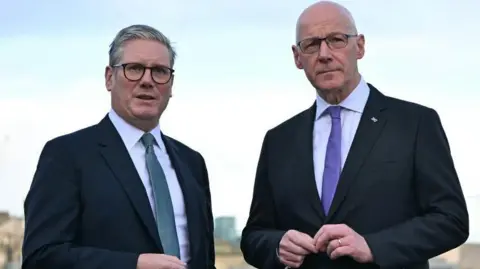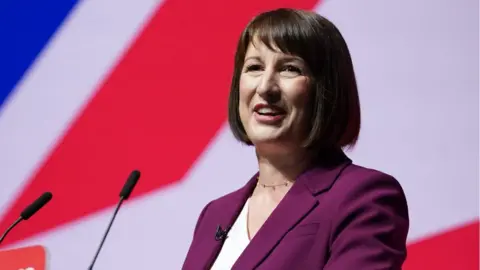Swinney calls for investment boost in UK budget
 PA Media
PA MediaFirst Minister John Swinney has urged the UK government to change fiscal rules so it can borrow more to fund public services.
Ahead of the Labour administration's first budget announcement next Wednesday, the SNP leader called for a change to how the Treasury measures debt.
He also backed income tax changes in England to raise revenues, warning that austerity measures would be "disastrous".
Swinney said that while he had "every sympathy" with UK Chancellor Rachel Reeves, she should not “prolong the gloom” after years of hardship.
A Treasury spokesperson said the chancellor has vowed to lead the "most pro-growth Treasury" in history.
The Scottish government, which will announce its own budget in December, has already made £500m of cuts to its budget for the current financial year.
It cited UK government austerity, as well as higher than expected pay deals, inflation, the pandemic and the war in Ukraine.
The first minster said an increase in UK government spending - which could lead to direct investment in Scotland or consequential boosts for the devolved administration's budget - was an "absolute necessity".
'Make or break'
Insiders have told the BBC that Sir Keir Starmer's government is looking to make tax rises and spending cuts to the value of £40bn in its budget.
Speaking at an event in Edinburgh, Swinney said the prime minister faced a "make or break" moment.
“The choice for the UK government could not be more stark, either continue with the current failed model of public spending cuts, which undermine growth, or chart a new course and invest to grow," he said.
Swinney said the Labour administration should seek to increase public sector investment to at least 3% of GDP following a "a long dark economic winter" since the 2008 financial crash.
He warned that the UK had fallen behind other developed nations who were spending nearly 4% of GDP a year on public services.
 PA Media
PA MediaThe SNP leader warned that he had "never before faced such a grave challenge in our public finances".
The first minister called for a change in the way the government measures its debt, which is subject to a limit.
Currently, the Treasury uses public sector net debt – most of which is held by central government – as its measure.
However, Swinney called for this to be replaced by public sector net worth, which is a more comprehensive measure including assets and liabilities.
'Imprisoned by fiscal rules'
Swinney added: “It is vital that we are not imprisoned by fiscal rules that undermine our ability to secure the path to investment.”
The Scottish government, which controls income tax north of the border, has changed rates and introduced new bands in recent years to raise additional revenue.
The first minister said if this approach was mirrored south of the border it would raise about £20bn.
He also called for detailed three-year spending plans to provide clarity to devolved administrations, and warned against an increase in employers' National Insurance without compensation for public bodies.
Swinney said any increase would mean the NHS, councils and other bodies would have to pay a higher tax bill.
“Do not make Scotland’s public sector pay for this increase in taxation," he said.
A Treasury spokesperson said: "The Chancellor has vowed to lead the most pro-growth Treasury in history and has been clear that it is important that we count the benefits of public investment and not just the cost of it.
"We have already taken action to deliver more investment in the UK economy by fixing the broken planning system and setting up a new National Wealth Fund, and the International Investment Summit secured a record-breaking £63bn in investment commitments."

John Swinney spent a long time serving as the Scottish government’s finance secretary. He’s comfortable talking about all things fiscal, and that was evident in this morning’s speech.
It was dense at points, but that’s because the first minister has concrete ideas about what the UK government should do in their budget.
He believes borrowing more to invest in public services will pay for itself. He argues that it leads to economic boosts - it will improve productivity, people will be healthier, and the UK can - simply put - work better.
It’s worth pointing out others believe there can be downsides to such borrowing, such as increased interest rates.
Swinney thinks the UK government will have to raise more money, and that tax rises for higher earners could be a logical place to start.
Though he expressed concern about an expected rise for National Insurance contributions for employers - pointing out that the public sector is a big employer in Scotland. If costs go up here, that could have a knock on effect for services.
The first minister’s team are keen to stress that he’s making this speech in the spirit of collaboration.
But with a Labour government stressing how difficult the economic situation currently is, it doesn’t feel like they’re tempted to turn on the spending taps.
